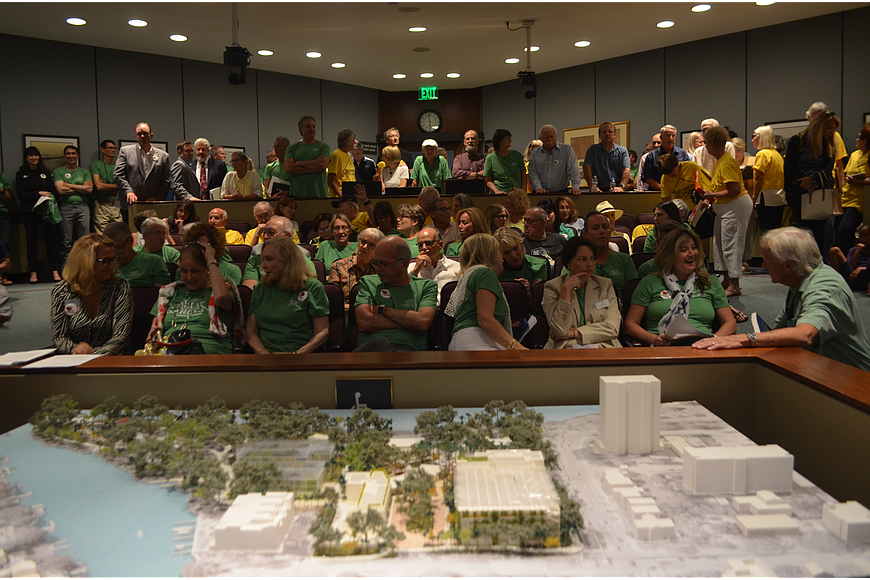- January 22, 2025
-
-
Loading

Loading

As Marie Selby Botanical Gardens works to revise its master plan following the city’s rejection of its initial proposal, it’s making adjustments that directly address public concerns about the scale and intensity of the project.
In the wake of the announced revisions, however, residents living near the botanical gardens who opposed the first proposal remained skeptical of Selby’s plans for its property.
Selby Gardens President and CEO Jennifer Rominiecki said Wednesday the organization was announcing three key points relating to the development of a “compromise master plan” for the nonprofit’s 14.7-acre bayfront site. Although a new proposal has not been finalized, Rominiecki said Selby would no longer be seeking a revision to the city’s comprehensive plan to facilitate the implementation of a master plan.
As a result, Rominiecki said plans for a new parking structure on the property would have to meet a maximum height limit of 45 feet. Additionally, a new restaurant on the property would need to qualify as an accessory use to the botanical gardens rather than a stand-alone operation.
“We feel these are major compromises,” Rominiecki said.
All three points in Selby’s announcement are a response to leading criticisms of the previous master plan proposal. At a series of public hearings in September, October and November, project opponents argued the proposed 75-foot parking garage was out of scale with the site’s surroundings. Critics said plans for an on-site restaurant represented the commercialization of the land and that a comprehensive plan change to the Metropolitan / Regional land use classification was inappropriate for the property, located just south of downtown.
Although Selby representatives argued those changes were in line with best planning practices and would not significantly affect surrounding neighborhoods, the City Commission voted 3-2 to deny the master plan application.
Following the November rejection, Rominiecki said Selby’s board of directors tasked staff with evaluating all options for the organization’s future. For now, the focus is on finding a compromise. On Dec. 11, Selby submitted an application to the city seeking to hold a community workshop regarding the suggested compromises in early 2020. A date for the workshop has not yet been set.
Selby said the three provisions were crafted in response to nearly 30 hours of public hearings on the initial master plan, as well as dozens of independent community meetings held as Selby went through the city’s development review process. But vocal critics of the initial proposal were not happy with Selby’s announced changes, instead expressing concern about the approach to revising the master plan.
Susan Chapman, a Hudson Bayou resident, said she was still concerned about the possibility Selby would use Orange Avenue as a primary access point onto and off of the property. Visitors to Selby Gardens can currently use Orange Avenue to access a parking lot on the site, but Chapman wanted to see Selby take additional steps to address potential traffic issues on the residential street near U.S. 41.
Chapman also took issue with the number of events held at the Selby Gardens site, both presently and possibly in the future if the site is redeveloped.
“There are a lot of unanswered questions, and there’s nothing in this that gives me any details,” Chapman said of Selby’s announcement and the community workshop application.
Ahead of the community workshop, Rominiecki said Selby has already begun holding “listening sessions” with those living around the botanical gardens site. Robert Bernstein, president of the nearby Bay Point Park Neighborhood Association, said he had met with Selby officials one time after the city denied the master plan. He thought that was inadequate and expressed frustration that Selby, which has not submitted a revised site plan, was working to organize a community workshop.
Bernstein and Chapman both suggested Selby should be moving more slowly and doing more to engage with residents as it produces a new master plan. They said the contentious process of reviewing the first master plan, which spanned more than two years, made them wary of Selby as it seeks to make operational changes to its property.
“They are pros at taking facts and twisting them to their favor, and we’re just suspicious,” Bernstein said. “Until they are totally upfront, honest and don’t twist words around, we’ll continue to be suspicious.”
Although some project opponents are already unhappy with the second round of the master planning process, Rominiecki was optimistic the new proposal would be warmly received.
“We are certainly hopeful as an institution that these changes will garner wide-ranging support in the community,” Rominiecki said.
This story has been updated to include comments from residents Robert Bernstein and Susan Chapman.